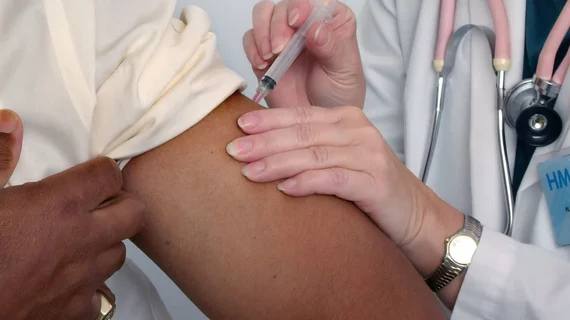Risk of vaccine-related heart damage after booster shot lower than it was after first 2 doses
Patients receiving a third dose of a COVID-19 vaccine face a low risk of myocarditis, according to new findings published in JAMA.[1] However, researchers added, the risk of myocarditis after a third dose appears to be lower than it was after a second dose.
The study’s authors tracked data from more than 126,000 adult military recruits in Israel. All received a booster shot of the Pfizer-BioNTech COVID-19 vaccine in August or September 2021. They monitored the health records of all patients through Oct. 14.
The cohort included a total of 126,029 recruits. Ninety percent of women and 79% of men were between the ages of 18 and 24 years old. Overall, nine cases of myocarditis were reported—all among young male recruits. One case was excluded because it was linked to a diagnosis of COVID-19. The remaining eight myocarditis cases were all mild. There were no signs of congestive heart failure or arrhythmia.
Based on their findings, the researchers estimated that the incidence of myocarditis one week after vaccination among this patient population was 3.17 cases per 100,000 vaccines given. One week after the second dose of the Pfizer-BioNTech COVID-19 vaccine, the team noted, the incidence of myocarditis in a similar patient population was 5.07 per 100,000 vaccines administered.
“This study found a low risk of myocarditis after a third dose of BNT162b2 in Israeli military recruits,” wrote lead author Limor Friedensohn, MD, a specialist with Israel Defense Forces, and colleagues. “The incidence was lower than observed a week after a second dose of the vaccine in a similar Israeli military population.”
The researchers did say there was a chance of underdiagnosis because they focused on hospital data. However, they added, all suspected cases were referred to a hospital.
“The cause of the lower incidence of myocarditis following a third dose in comparison with the incidence after the second dose requires future research,” the group concluded.
Context on COVID-related myocarditis
Myocarditis, one of the most significant side effects associated with COVID-19, has been seen in a small number of patients after receiving a vaccine. Young men face the highest risk, especially those 30 years old and younger.
Most cases of vaccine-related myocarditis, however, are mild. Specialists throughout the world have emphasized that the benefits of vaccination far outweigh the risks.
Some differences do exist between traditional myocarditis and vaccine-related myocarditis. Symptoms typically resolve faster with vaccine-related myocarditis, for example, and treatment typically only includes pain management.
Related COVID-19 Content:
COVID-19 vaccines safe for patients with a history of heart damage
Losartan fails to improve lung injuries in hospitalized COVID-19 patients
Myocarditis, arrhythmias and more: An updated look at what cardiologists know about long COVID-19
‘We learned that lung recovery was actually possible’: ECMO’s impact on COVID-19 patients in the ICU
Telehealth provided value for heart failure patients during COVID-19 pandemic
Reference:

